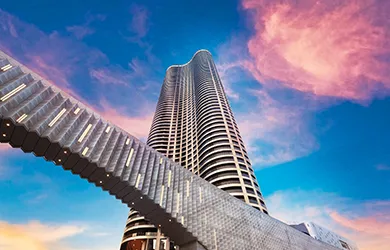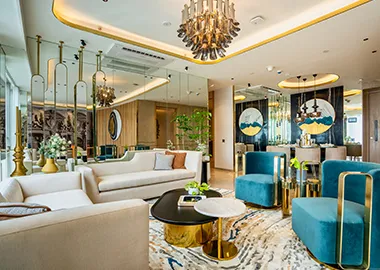Second Home Market in India: Trends and Homebuying Tips
By lodha
October 15, 2025

Over the past decade, real estate companies in India as well as the landscape have undergone a noticeable evolution, shaped by shifting lifestyles, growing disposable incomes, and an increased appreciation for personal well-being. Among the most significant outcomes of these changes is the rising interest in second homes—a segment once considered the preserve of the ultra-wealthy, now seeing growing traction among urban professionals, NRIs, and retirees alike.
What is a Second Home?
A second home refers to a residential property that is not the buyer’s primary place of residence. It may serve as a weekend retreat, a seasonal holiday home, or even a future retirement abode. Often situated in scenic or culturally rich locations, these homes offer a blend of lifestyle enhancement and long-term asset appreciation.
Unlike investment properties that are purchased purely for rental income, second homes typically balance utility and investment. They are spaces for rejuvenation, solitude, and family bonding—while also serving as a potential source of passive income when not in personal use.
The Need for a Second Home
The desire to own a second home is often driven by a combination of emotional and practical considerations. For many, it stems from the aspiration to escape the intensity of urban living—to have a sanctuary in the hills, by the sea, or amid forested greens. Locations such as Lonavala, Alibaug, Goa, Nainital, and Coorg have thus emerged as preferred destinations, offering cleaner air, slower rhythms, and proximity to nature.
Post-2020, the rise of hybrid work culture has further amplified this trend. With professionals now able to work remotely for extended periods, second homes are no longer confined to weekend visits—they’ve become liveable alternatives for parts of the year.
For NRIs, second homes in India offer a sentimental reconnection with their roots, while also acting as an investment hedge and future retirement option. For retirees and empty-nesters, these homes offer tranquillity and a lifestyle shift—often in gated communities or villa enclaves designed for comfort, wellness, and leisure.
Key Trends in India’s Second Home Market
Several noteworthy trends are shaping the second home market in India:
1. Emergence of branded developers
The real estate market in India is increasingly opting for second homes developed by reputed names, offering greater assurance in terms of construction quality, community experience, and long-term upkeep.
2. Gated enclaves with curated amenities
Whether it is a yoga pavilion by the hills or a wellness spa overlooking the river, second homes are increasingly being positioned as lifestyle statements—replete with concierge services, landscaped gardens, and security infrastructure.
3. Eco-conscious development
There is a growing inclination toward sustainable living—buyers are seeking homes built with eco-friendly materials, rainwater harvesting systems, solar power, and natural landscaping.
4. Dual-purpose homes
Many buyers are choosing properties that can serve both as personal retreats and income-generating assets through short-term rental platforms or managed leasing services. The ‘second home as investment’ phenomenon is directly related to demand for holiday rental homes which has seen an uptick in destinations like Goa, Alibaug, and the Nilgiris.
5. Accessibility and infrastructure
Locations within driving distance from metro cities, with robust connectivity, are seeing the highest demand. The development of expressways and regional airports is further catalysing this trend.
Tips for Buying a Second Home in India
While the idea of a second home is undoubtedly romantic, the decision must be rooted in diligence and foresight. Here are essential aspects to consider:
1. Location with long-term potential
Choose a location that not only appeals aesthetically but also shows consistent appreciation in land value. Proximity to highways, planned infrastructure, and demand for rentals can significantly influence future returns.
2. Legal due diligence
Ensure that the property has clear titles, proper zoning, and complies with local municipal and development norms. This is especially crucial in coastal or ecologically sensitive areas where regulations can be stringent.
3. Maintenance and management
Consider how the property will be maintained in your absence. Opting for a development with professional property management or caretaker services can offer peace of mind.
4. Connectivity and accessibility
Even the most scenic home loses value if it’s too remote. Evaluate road conditions, proximity to medical services, grocery stores, and emergency infrastructure.
5. Rental potential and taxation
If you intend to lease out the home when not in use, study the local rental market, seasonality, and applicable taxes on income and capital gains. Opt for professional rental management, if needed.
6. Align with your lifestyle
Lastly, ensure the home resonates with your idea of leisure and comfort. Whether it’s quietude by a lake or a vibrant community in the hills, the second home should feel like an extension of your ideal lifestyle.
In conclusion, the Mumbai real estate market, as well as the Pune and Bangalore real estate market is no longer looking at second homes as a niche—it is a thoughtful choice for those seeking balance, belonging, and long-term value. For those considering a second home, Lodha presents exceptional options in destinations like Alibaug, Pune, Bangalore, as well as close to Mumbai. Blending natural beauty with thoughtful design and world-class amenities, each Lodha residence offers not just a retreat—but a lasting investment in comfort, wellness, and value.
Coupled with the right research and alignment to personal needs, a Lodha second home can be both a sanctuary and a savvy investment for the future.
You may also like



 Enquire
Enquire
 Call
Call
 chat
chat
 Search
Search





